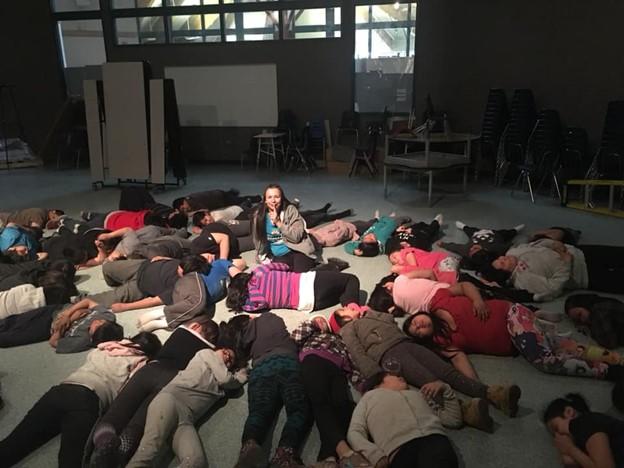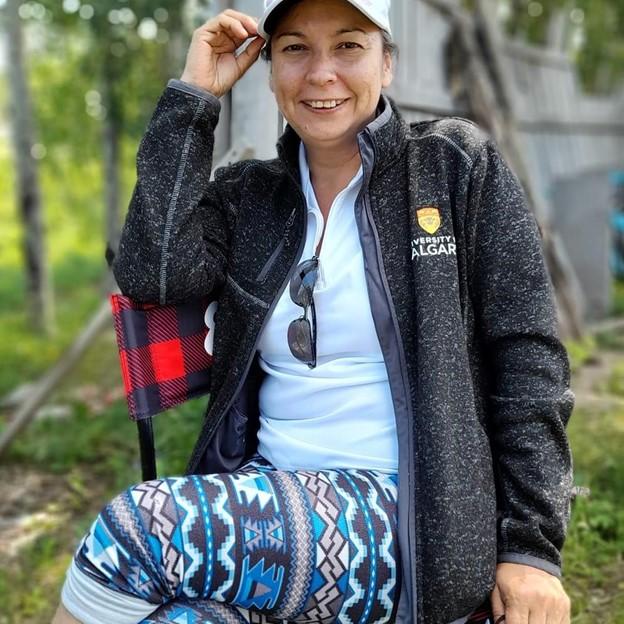Advocate for Indigenous healing noticed something was missing: a personal connection

Tanya Dawn McDougall slowly walked through the corridors of the St. Theresa Early Years School, her hand curled softly around the tight fist of a small child. The school administrator in the remote community in central eastern Manitoba knew the boy had recently been through an extremely traumatic event in his home — news travels fast in small, rural communities — and so perhaps she was more clearly focused on the boy’s well-being and state of mind on this day.
She brought the boy into a room to meet with a visiting school psychologist for a psycho-educational assessment, and quietly explained to the assessor that while the child did have some learning challenges, his more immediate situation made him particularly vulnerable.
The psychologist listened, and then asked that the boy be taken away, saying he was too young and his issues were too much trouble to manage on such a short visit.
The next day Tanya Dawn signed up to earn her Master of Education degree in School and Applied Child Psychology through a special program offered by the University of Calgary’s Werklund School of Education, a unique program that offered her the opportunity to have a work-life-education balance that worked for her.
Working full-time and chasing a graduate degree is not an easy task for anyone. Throw in the fact that the closest university is more than 450 kilometres away — by air, since there are no roads to get there — and most people would give up; the obstacles are just too big, and most would assume there were no viable options available.
Tanya Dawn McDougall is not one of those people.

Tanya Dawn takes part in an overnight event at her school.
St. Theresa School staff
Self-advocacy opens doors
Raised in St. Theresa Point, Tanya Dawn’s studies took her to university in Winnipeg and love and marriage took her to Brandon where her husband was studying. She thought she’d pursue a teaching degree, but it was a struggle as she was refused more than once for various reasons.
Tanya Dawn took matters into her own hands. She took the rejections up to the president, who in turn sent her to the new dean of education, who after meeting and talking with her, quickly accepted Tanya Dawn into the program.
Equipped with education degrees, she and her husband then returned home to work in the schools. Once back in St. Theresa Point, Tanya Dawn noticed the school psychologists flown in to do assessments had limited time to interview only a small portion of the students who needed evaluations. They then flew out and the pattern was repeated, with little or no knowledge of community dynamics.
“The assessment reports seemed awfully similar, and I didn’t think they reflected who those children were,” she says.
I don’t blame the psychologist. But I figured if it’s not being done right, I’ll see if I can do it myself.
After enrolling in a Werklund cohort organized in collaboration with the Manitoba First Nations Education Resource Centre, which involved online and in-person classes (led by UCalgary instructors in Winnipeg, who came once every three weekends to teach) as well as on-campus and training in the community, Tanya Dawn earned her MEd and was ready to become certified. But something was bothering her. She kept thinking about the lack of connection between those visiting psychologists and her community.
It's intentional. The Psychological Association of Manitoba (PAM) deliberately requires that assessors not have relationships with the people of the community in which they serve. Likewise, the Canadian Psychological Association strongly recommends against the practice. Called “dual relationships,” there’s a concern about crossing a line between professional work and personal connection. And while that might make sense in a western context, Tanya Dawn says it poses a problem for her. “I had a big barrier when it came to the issue of dual relationships,” she says. “I had just spent the last five or six years establishing those relationships in the school.”
Tanya Dawn believes barring those who know and are known in the community from working together is not a good way forward for Indigenous communities. She says connection is vital — for trust, for knowledge, for overall connection and understanding. She believes the people with child psychological services need to know the community, to be part of it. “That principle (of dual relationships) does not follow our community values. For us, the fact that you have a stronger relationship with somebody makes it more beneficial,” she explains.
Something had to change.

Courtesy Tanya Dawn McDougall
Taking on the system to change the status quo
Tanya Dawn talked with one of her UCalgary instructors, Dr. Michael Zwiers, PhD, who encouraged her to talk to the Elders in her community to get their perspectives on this issue, and to continue to advocate for her beliefs.
Zwiers, who taught the program’s professional ethics course, says, “Western value systems have imposed upon Indigenous people for centuries. But today, community leaders like Tanya Dawn are accessing traditional values and practices to inform their understanding of professional relationships and ethics.”
Tanya Dawn’s belief that the western system needs to be changed to accommodate Indigenous psychology is strong, and she is pushing for it. And she hopes the PAM, with open minds and consideration for the Truth and Reconciliation Commission of Canada’s Calls-to-Action, is willing to listen.
She’s found a supervisor in Winnipeg who has signed on to support her as she works towards PAM certification. She’s presenting on Indigenous perspectives on dual relationships at the annual CPA conference in Calgary in June and says her drive to enact change comes from what she knows is the right path forward. And if the past is any indicator, Tanya Dawn McDougall, MEd’21, will get it done.
“I love the children here so much,” she says. “My passion is to work with my community.”







